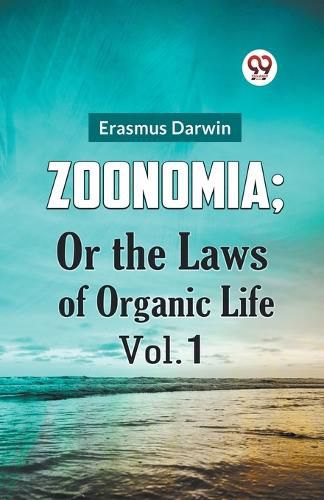Readings Newsletter
Become a Readings Member to make your shopping experience even easier.
Sign in or sign up for free!
You’re not far away from qualifying for FREE standard shipping within Australia
You’ve qualified for FREE standard shipping within Australia
The cart is loading…






This title is printed to order. This book may have been self-published. If so, we cannot guarantee the quality of the content. In the main most books will have gone through the editing process however some may not. We therefore suggest that you be aware of this before ordering this book. If in doubt check either the author or publisher’s details as we are unable to accept any returns unless they are faulty. Please contact us if you have any questions.
"Zoonomia; or, The Laws of Organic Life" is a pioneering clinical and philosophical work written through Erasmus Darwin, an 18th-century English physician, herbal truth seeker, and grandfather of Charles Darwin. "Zoonomia" is a groundbreaking exploration of diverse elements of biology, medicine, and the natural international. Erasmus Darwin's "Zoonomia" is a comprehensive examination of the standards governing natural lifestyles. The book covers a huge range of subjects, which includes anatomy, physiology, pathology, and the philosophy of existence. Darwin's work become high-quality for its early advocacy of evolutionary ideas, as he recommended that species could change through the years via a technique of model. One of the maximum giant contributions of "Zoonomia" is its exploration of the idea of transmutation, which laid the groundwork for later evolutionary theories. Erasmus Darwin proposed the concept that all life forms shared a commonplace ancestry and that they could undergo slow variations to better suit their environments. Although not as well-known as his grandson Charles Darwin's later paintings on evolution, "Zoonomia" changed into an important precursor to the improvement of evolutionary thought. It also contributed to the wider scientific and clinical discussions of its time, making it an enormous work in the history of biology and herbal philosophy.
$9.00 standard shipping within Australia
FREE standard shipping within Australia for orders over $100.00
Express & International shipping calculated at checkout
This title is printed to order. This book may have been self-published. If so, we cannot guarantee the quality of the content. In the main most books will have gone through the editing process however some may not. We therefore suggest that you be aware of this before ordering this book. If in doubt check either the author or publisher’s details as we are unable to accept any returns unless they are faulty. Please contact us if you have any questions.
"Zoonomia; or, The Laws of Organic Life" is a pioneering clinical and philosophical work written through Erasmus Darwin, an 18th-century English physician, herbal truth seeker, and grandfather of Charles Darwin. "Zoonomia" is a groundbreaking exploration of diverse elements of biology, medicine, and the natural international. Erasmus Darwin's "Zoonomia" is a comprehensive examination of the standards governing natural lifestyles. The book covers a huge range of subjects, which includes anatomy, physiology, pathology, and the philosophy of existence. Darwin's work become high-quality for its early advocacy of evolutionary ideas, as he recommended that species could change through the years via a technique of model. One of the maximum giant contributions of "Zoonomia" is its exploration of the idea of transmutation, which laid the groundwork for later evolutionary theories. Erasmus Darwin proposed the concept that all life forms shared a commonplace ancestry and that they could undergo slow variations to better suit their environments. Although not as well-known as his grandson Charles Darwin's later paintings on evolution, "Zoonomia" changed into an important precursor to the improvement of evolutionary thought. It also contributed to the wider scientific and clinical discussions of its time, making it an enormous work in the history of biology and herbal philosophy.